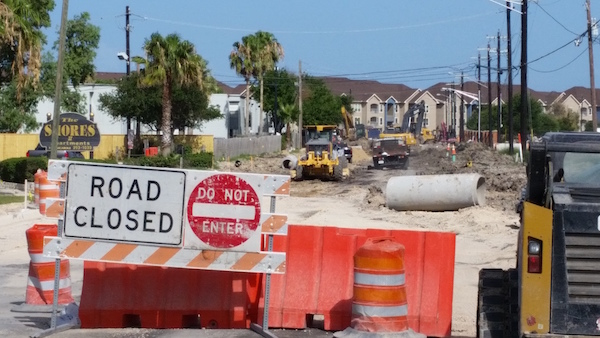
A 2-cent-per-year ad valorem tax increase approved by voters in 2016 will be used to help pay for $128 million in street repairs in the 2019-20 budget, which was approved by the City Council on September 17. Photo by Carrie Robertson Meyer/Third Coast Photo
City property taxes could increase by 2 cents per year per $100,0000 valuation over a three-year period (for a total of 6 cents) to help pay for reconstruction of residential streets. Proposition 1, which establishes a dedicated fund to be used solely for residential street construction, could show up on the Nov. 8 general election ballot.
A recommendation for the tax was presented to the council at a June meeting by the city charter review committee. The proposal addresses recommendations from the city’s residential street committee.
The tax would raise about $10 million of the projected $10 million-$20 million estimated by the street committee that would be needed to restore city streets to an acceptable standard. The higher estimate includes pothole repair, which would not be part of work funded by the new tax.
“We need to effectively communicate to people that this is going to be solely for residential streets,” said John Bell during the presentation. Bell is chair of the charter review committee recommending the ballot proposition. “If we are going to ask voters for new funding, it should be going to substantial work, not patching potholes.”
Bell also emphasized that budget cuts alone would not solve the city’s transportation infrastructure problems.
“This is the only option,” he said. “If people want to get serious about the streets, this is a way for them to do that.”
The tax would not address the whole issue, he continued. Other revenues would be needed, such as possibly adjusting the street maintenance fee that was enacted three years ago.
Mayor Nelda Martinez said an ad valorem tax would provide a tax write-off for residents, which is not possible with the street maintenance fee. She also asked about whether the tax increase would be subject to a rollback. Under state law, property tax increases that go over a certain limit can be subject to a rollback election if called for by taxpayers. The state legislature is expected to take up a bill in 2017 that would make a rollback automatic.
Council member Colleen Mcintyre pointed out that residents would potentially be voting on the increase four different times since it would be implemented in stages. The council would also have to approve it as many times.
“We would have a clear indication from residents that we are willing to pay for our streets to be fixed,” McIntyre said. “The clarity in the bond language is going to be paramount to allow voters to understand where the funds go to.”
McIntyre also stressed that the issue be a pay-as-you-go program, not a bond issue. Bell answered that the council is already using bond money as a tool to fix streets.
“This is substantial new funding,” he said. “You won’t have bond lawyers and others that are part of the cost of bonds.”
The graduated tax rollout would allow for a steady progression of street improvements that would help the economy by growing small, local contractors who could bid on the projects. Another benefit: No debt would be involved. In fact, the language of the proposition would exclude any of the money being used to service debt or cover other city expenses.
In a subsequent meeting, council modified the language to include using the money on upgrading utilities under the streets.
“I think if we are going to dig up the ground, we should do it once rather than two or three times,” council member Michael Hunter said.
The city has until Aug. 16 to make a final decision to put the measure on the ballot.





